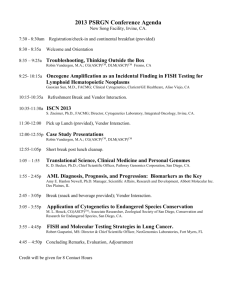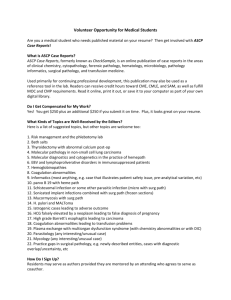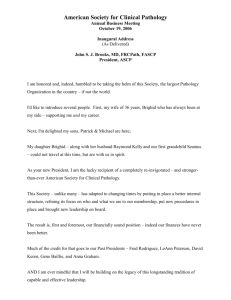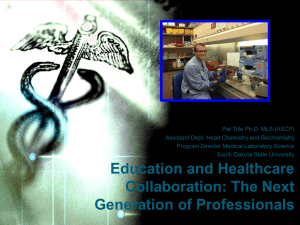Consultant Position Description
advertisement
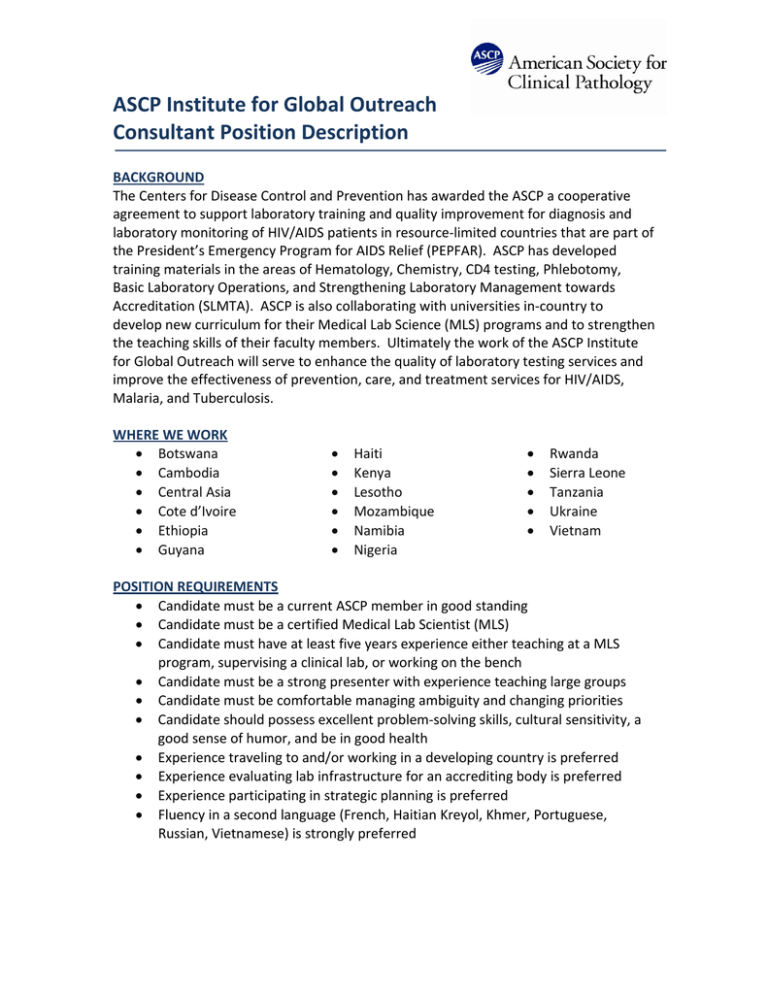
ASCP Institute for Global Outreach Consultant Position Description BACKGROUND The Centers for Disease Control and Prevention has awarded the ASCP a cooperative agreement to support laboratory training and quality improvement for diagnosis and laboratory monitoring of HIV/AIDS patients in resource‐limited countries that are part of the President’s Emergency Program for AIDS Relief (PEPFAR). ASCP has developed training materials in the areas of Hematology, Chemistry, CD4 testing, Phlebotomy, Basic Laboratory Operations, and Strengthening Laboratory Management towards Accreditation (SLMTA). ASCP is also collaborating with universities in‐country to develop new curriculum for their Medical Lab Science (MLS) programs and to strengthen the teaching skills of their faculty members. Ultimately the work of the ASCP Institute for Global Outreach will serve to enhance the quality of laboratory testing services and improve the effectiveness of prevention, care, and treatment services for HIV/AIDS, Malaria, and Tuberculosis. WHERE WE WORK • Botswana • Haiti • Rwanda • Kenya • Sierra Leone • Cambodia • Central Asia • Lesotho • Tanzania • Cote d’Ivoire • Mozambique • Ukraine • Ethiopia • Namibia • Vietnam • Guyana • Nigeria POSITION REQUIREMENTS • Candidate must be a current ASCP member in good standing • Candidate must be a certified Medical Lab Scientist (MLS) • Candidate must have at least five years experience either teaching at a MLS program, supervising a clinical lab, or working on the bench • Candidate must be a strong presenter with experience teaching large groups • Candidate must be comfortable managing ambiguity and changing priorities • Candidate should possess excellent problem‐solving skills, cultural sensitivity, a good sense of humor, and be in good health • Experience traveling to and/or working in a developing country is preferred • Experience evaluating lab infrastructure for an accrediting body is preferred • Experience participating in strategic planning is preferred • Fluency in a second language (French, Haitian Kreyol, Khmer, Portuguese, Russian, Vietnamese) is strongly preferred SELECTION PROCESS ASCP receives dozens of applications each year for a limited number of opportunities. Once an application has been processed, promising candidates are contacted for a phone interview with an ASCP staff member. ASCP reserves the right to accept only those individuals whose skills best match the scope of work of the projects. Individuals may also be accepted if it is felt that their skills maybe useful for future activities that have not yet been determined. ASCP Institute strives to offer opportunities to all accepted consultants; however acceptance into the ASCP Institute for Global Outreach Consultancy Pool does not guarantee an individual assignment. Assignments are based on individual skill sets, prior experience, and availability and are made at the discretion of the senior management on the project. COVERED COSTS International Travel ASCP agrees to pay for the following items for ASCP consultants involved in projects requiring international travel: • Round‐trip airfare • Lodging for the length of the consultancy • US State Department per diem rates for meals and incidentals • Travel‐required immunizations and medications • Travel insurance Consultants will be reimbursed for all above costs, excluding lodging, airfare and travel insurance which are paid in advance by ASCP. Consultants are expected to complete an expense report and provide receipts for all purchases above $25.00 USD. ASCP reserves the right to deny reimbursement for any costs that are not covered by grant guidelines set forth by the United States Department of Health and Human Services. Domestic Travel ASCP agrees to pay for the following items for ASCP consultants involved activities that require domestic travel: • Round‐trip airfare • Lodging for the length of the consultancy • US State Department per diem rates for meals and incidentals Consultants will be reimbursed for all above costs, excluding lodging and airfare which are paid in advance by ASCP. Consultants are expected to complete an expense report and provide receipts for all purchases above $25.00 USD. ASCP reserves the right to deny reimbursement for any costs that are not covered by grant guidelines set forth by the United States Department of Health and Human Services. CONSULTANT OPPORTUNITIES As a consultant for the ASCP Institute for Global Outreach, individuals are asked to participate in any or all of the following activities based on their experience, interests, and availability. Some opportunities may require domestic or international travel. Assessments ASCP conducts an initial assessment of sites in each country where it is asked to work. An ASCP consultant and staff member meet with a country’s key stakeholders and in‐ country partners to build relationships and assess the needs of the laboratory infrastructure, become familiar with locally‐utilized instrumentation, perform site visits and create a scope of work for the following year. Assessments also provide an opportunity to customize ASCP’s training curriculum to meet the needs of each country. International travel is a requirement. Assessments typically occur over 5 days and include additional travel time of 2‐3 days dependent on the destination. Trainings Trainings are conducted in‐country in the areas of Basic Lab Operations, Clinical Chemistry, Hematology, CD4 Testing, Phlebotomy, and Strengthening Laboratory Management Towards Accreditation (SLMTA). Trainings are conducted in teams of 2‐6 consultants with one ASCP staff person accompanying the team to provide logistical support. International travel is a requirement. Trainings last from 5 business days to 10 business days with additional travel time of 2‐ 4 days dependent on the destination. Trainings in Clinical Chemistry, Hematology, CD4 Testing, and Phlebotomy include didactic and hands‐on training on the equipment. Consultants present the material through Power Point lectures, case studies, demonstrations and group discussion. The hands‐on portion is usually conducted by trainers from equipment vendors in country. Clinical Chemistry, Hematology, and CD4 trainings can be conducted together over a period of 8‐10 business days. These trainings may contain a “Teach‐Back” component which allows participants to teach the material they have learned back to their peers and to receive feedback and suggestions from the ASCP consultants. After the ASCP training, participants “Roll‐Out” the training by teaching it to their peers in other regions and labs. One or two ASCP consultants observe these “Roll‐Out” trainings to offer guidance and answer questions. Trainings in Strengthening Laboratory Management Towards Accreditation (SLMTA) and the Basic Laboratory Operations Training (BLOT) are task‐based and include didactic lecture as well as group activities, case studies, and group discussion. Both training programs require an extensive Improvement Project to be implemented by participants over a period of months. Therefore, these activities require specific Baseline and Post Assessments to monitor the progress made in each participant lab. BLOT is conducted over 5 days. SLMTA is conducted through three separate 5‐day workshops as part of an extensive program facilitated by cooperative partners, the CDC, and in‐country partners. Individuals interested in participating in the SLMTA training programs must be accepted into a rigorous 2‐week Training of Trainers program and must have availability to travel to a country at least six times in a nine month period. Mentorship Mentorship requires international travel and availability to travel in‐country for 4 weeks to 6 months. Consultants participating in a Mentorship must possess a strong level of independence. Mentorships are performed by an individual consultant with remote ASCP staff support. Individuals considering a mentorship must be comfortable arranging their own transportation and meals during the length of their consultancy. Consultants performing a long‐term Mentorship are compensated for their consultancy work. The scope of work for a Mentorship is determined by ASCP and in‐country partners for each project. In the past, mentorships have included projects such as creating and implementing a Quality Assurance plan at a reference laboratory, mentoring at the management‐ or bench‐level at various labs, implementing new curriculum at the university program level, and designing a strategic plan for a country’s laboratory infrastructure. Pre‐Service Program Consultants who are asked to serve as part of the Pre‐Service Program are current or recent faculty members with relationships to MLS programs in the United States. Pre‐ Service work requires extensive experience teaching and developing curriculum for any of the following areas: Bacteriology, Clinical Chemistry, CD4 Testing, Hematology, Histology, Immunology, Microbiology, Mycology, and Parasitology. The Pre‐Service Curriculum Development Program is a 24‐month program designed to enhance the existing curriculum for MLS programs in resource‐limited countries. Consultants who work with the Pre‐Service Program for a given country will need to have availability to travel to that country for at least 1 week up to 4‐5 times in a 24 month period. The Pre‐Service program consists of an initial Pre‐Service Assessment at the chosen school(s), a Curriculum Review Workshop or a Curriculum Development Workshop, a Teaching Methodologies Training, a Curriculum Finalization Workshop, a Faculty Development Mentorship, and a final Situational Analysis. Candidates who do not display a commitment to participating in at least three of the above activities will not be considered for the Pre‐Service Program.
